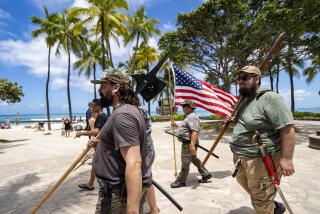Women Are Ready to Call the Shots This Time ‘Round
- Share via
Tuesday is Ladies’ Day at the Firing Line in Huntington Beach. Women may shoot for free; many do.
Kyoko Kimura, 19 years old, a student visiting from Japan, is holding a semiautomatic 9 m.m. pistol in her grip. This is a weapon, all black, that looks especially mean. Kyoko is from a nation where the law prohibits civilians from owning guns. She has never fired a lethal weapon before.
“I have only seen it in the movies,” she says. “So when I felt it, it felt very shocking. Hmm. And powerful. Yeah, that’s how it made me feel.”
Kyoto nods to emphasize her point. Then her mouth forms a rather bashful smile. She says she went to the movies just the other night, to see “Terminator 2.” It is her favorite movie so far. She hasn’t yet taken in “Thelma & Louise.”
American women, too, are feeling the surge of power that handling a weapon can bring. The firearms industry says the number of women gun owners is up and climbing every day. Manufacturers are tailoring guns to better accommodate the female grip. These guns have cute sounding names.
The women who are buying, and those practicing their aim the other night in Huntington Beach, say owning a gun makes them feel safe--on equal terms, finally, with the low-lifes who might mistake them for easy prey. Suddenly these women are someone to be reckoned with, someone to fear, someone with control.
They don’t have to just take it anymore.
And there is a lot to be said for that. Fight fire with fire before it turns you to ash. Turn the other cheek and you might get shot.
All of which leaves me feeling ambivalent--sad and scared, but with a good dose of “It’s about time” thrown in. Women don’t have to be wusses. And we don’t have to be men. Yet the so-called feminine attributes--tolerance, kindness, nurturing, to name a few--don’t seem to be catching on with the citizenry at large.
So equality can come via the lowest common denominator too. A gun. Check out “Thelma & Louise.”
“If they come across my door, I wouldn’t hesitate to shoot,” says Wendy, a secretary from Tustin who asks that I not use her last name. She is at the shooting range tonight after a particularly stressful day at work. Firing lets off steam.
Wendy’s husband, a carpenter, is by her side. He describes what it’s like, loading up, getting in your stance, aiming and then bang, letting it go. A smile spreads across his face. Wendy lights up too.
Soo Lin Herman, an accountant, is with her husband, Jeff Herman, an engineer. The two of them look about as threatening as me. That is to say, pretty tame.
“If it really came down to me or them, I would probably hurt myself,” Soo Lin says.
Still, a handgun is an intriguing prospect. Neither she nor her husband owns one--and they have no plans to yet--but they’ll probably come back to shoot. This is their second time out.
“It’s kind of a thrill,” Soo Lin says. “It’s weird to say that, but it is.”
Men, of course, have been saying that for generations, without any qualifiers at all. Just is. Bang, bang, you’re dead. I win. Little boys, mostly, grow up on the game.
So when women find out that maybe they’ve been missing out on the fun, it becomes news. Different. Kind of weird. A thrill.
It’s good and bad.
Norma Holland grew up with guns, starting shooting when she was 5. She spent 24 years in the Marines, in armor, working on guns. Now she teaches firearm safety courses at Rancho Santiago College.
Norma says her blender scares her more than her guns. Norma is not like most women I meet when it comes to guns.
“The problem with people buying guns is they are frightened by some mad rapist, so they go out and buy a gun, then they load it, put it in a closet and forget about it,” she says. “That’s like taking a power saw and leaving it around. Next thing you know, somebody gets shot.”
Norma thinks gun owners should learn to use the weapons they own, as a tool, just like you’d learn how to drive before getting behind the wheel of your new car. This should be encouraged, she says, but not mandated by law.
Norma suggests that maybe I should learn how to shoot a gun too. I tell her no thanks, that, quite frankly, they give me the creeps. I’ve been programmed that way, is what Norma says; I concede that she may be right.
I wouldn’t have a gun in my home. I hope.
Back at the firing range, Terry Debord, a private security guard, had come to train on a .45 automatic. These are very powerful guns. Terry says that’s what she’d use as a personal bodyguard for corporate women, which she figures to be her next career move. The demand for such protection, she says, is great.
Terry works in Newport Beach.
But after she’s finished shooting for the night, Kyoko Kimura says that even if the laws were changed, she wouldn’t own a gun in Japan.
“I feel in Japan it is very safe, even at midnight,” Kyoko says. “I can walk safely, alone, even in downtown Tokyo.”
And if she lived here?
“Yes, I would own a gun here,” she says. “Everybody has a gun. Right?”


